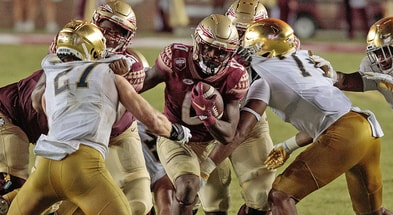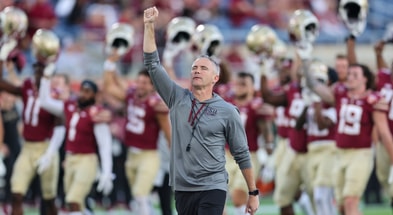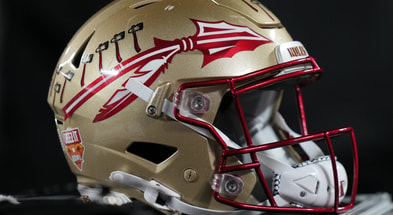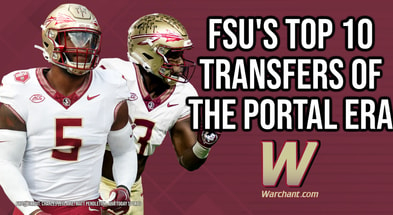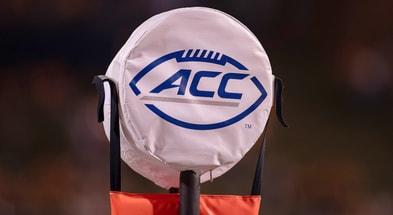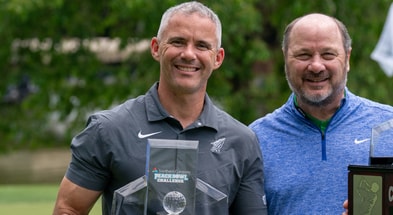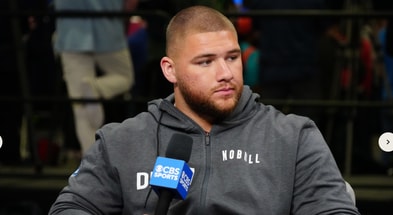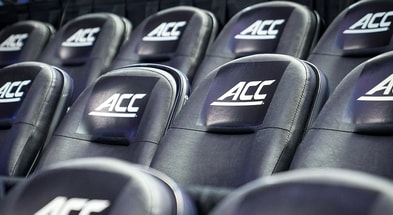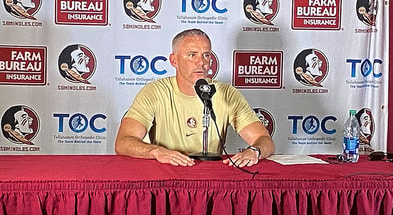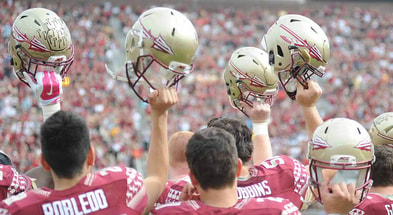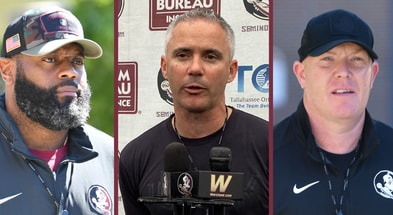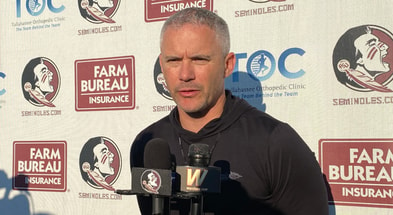ACC's Jim Phillips insists league on solid ground despite lawsuits, 'seismic shift'
AMELIA ISLAND — Even as his conference faces monumental challenges internally and externally — with two powerful member schools suing to leave and another perhaps considering it, plus an ever-widening revenue gap with two rival leagues — ACC Commissioner Jim Phillips repeatedly said Wednesday he remains “optimistic” about the future.
That positive outlook might seem difficult to fathom when considering all of the headwinds the Atlantic Coast Conference is facing. Yet Phillips never wavered during a nearly 30-minute conversation with reporters on the final day of the league’s spring meetings.
To his credit, Phillips addressed most of the challenges, including the FSU and Clemson lawsuits, before even being asked.
He acknowledged that the ACC’s revenue gap with the Big Ten and SEC is only going to widen as a result of the new College Football Playoff expansion formula. He addressed negative perceptions of the conference, which have led to worthy teams being left out of the postseason. And he admitted that he has concerns about the future of college sports in general.
But Phillips reiterated multiple times that the ACC is on solid ground and will continue to be so in the future, even if no one knows what that landscape will look like.
“This is a seismic shift in college athletics,” he said. “And it’s not a matter of if it’s going to happen, it’s happening now. I think we’re all seeing it. And it just didn’t start in the last few months. It started over the last several years. The reality is we continue to be at the forefront, the ACC continues to be at the forefront of this change with other conferences and other leaders. And we’re navigating these things together as best we can.
“I don’t think anybody really knows where this thing is ultimately going to end, but certainly feel great about where the ACC is positioned now into the future. And we will continue to be a major contributor to the destination of where college athletics goes.”
To do that, ACC schools will have to overcome a financial disparity that seems to grow by the minute. Not only are schools in the Big Ten and SEC soon expected to take in $30-40 million more per year than their counterparts in the ACC, but those numbers will only increase with the new 12-team College Football Playoff.
According to reports, schools in the SEC and Big Ten will both receive more than $20 million each year from that deal, while ACC programs will get about $13 million and Big 12 schools will receive $12 million.
Florida State athletics director Michael Alford expressed frustration about that disparity when speaking with Warchant and other media outlets on Tuesday, and Phillips echoed that dissatisfaction. But he said on-the-field metrics were used to determine those payouts and suggested there was little he could do.
“When you look at some of the metrics … that were used in that calculation, that’s where we’ve performed,” Phillips said. “We’ve performed at the 17 to 18 percent. And Clemson’s been the carrier of that. The Big Ten’s performed at the 27-28 percent, and the SEC’s performed at the 44 percent, 45 percent. So it was about trying to come together, get to the right number.
“I felt like I negotiated hard, just like every conference did. And we got to a place that at the end of the day, do you love it? You don’t love it. But certainly it was better than where we started. And it’s more than we’ve ever had relative to CFP dollars. But again, I understand it causes even a greater gap.”
Another new concern this year are questions surrounding the ACC’s long-term television contract with ESPN. That deal, and the corresponding Grant of Rights, were both believed to be inked through 2036.
But FSU’s attorneys have argued in their lawsuit against the conference that ESPN actually is not obligated to carry the contract through that date. They contend the network has to opt-in to extend it past 2027, and that decision must come by February 2025.
Phillips painted a different picture and said the ACC had “excellent” meetings with ESPN this week at the spring event.
“The contract runs through ’36, and we’re working with them internally on a piece of the contract,” Phillips said. “I can’t go into the details on it, but the partnership is not going away or going to be affected in a negative light or a negative way at all. It’s a look-in, and we’re handling some of what that particular element of the contract states.”
When asked if there was any chance the financial terms would be adjusted during that look-in, Phillips declined to speculate.
“We haven’t gotten to the finish line yet,” he said.
Phillips also was asked multiple questions about the ACC’s ongoing legal battles with FSU and Clemson in the states of North Carolina, South Carolina and Florida.
“It’s difficult. It’s disruptive. It’s harmful. But that’s the world we live in,” he said, adding that it hasn’t changed the way the ACC works with those schools and how the league treats their student-athletes.
“We’ll let the legal folks handle it,” Phillips said.
While it seems exceedingly unlikely that the conference and those schools could work out their differences and halt the legal proceedings, the commissioner said he won’t lose hope until any judgments or deals are finalized.
“You always stay optimistic. I think you’ve been around me enough — you have to stay optimistic,” Phillips said.
But he added that he stands by the conference’s right to file its own lawsuits against FSU and Clemson for breach of contract and other claims.
“Am I going to fight and protect the ACC? Absolutely,” Phillips said. “I have to do that. That’s my responsibility.”
He also declined to comment on concerns about the conference’s future aired this week by members of the University of North Carolina Board of Trustees.
Phillips said no one from UNC has reached out to him or the league office about those issues.
“Those are campus discussions and campus politics that are going on,” he said. “So I don’t know what’s true and what’s not.”
As he does each year at the conclusion of the spring meetings, Phillips detailed many of the league’s accomplishments from the prior 12 months.
Along with on-the-field success in different sports, he said the addition of three “world class institutions” — Stanford, Cal and SMU — has yielded additional revenue from ESPN. He said the league also has seen major growth in terms of sponsorships and marketing deals.
He called the ACC’s new “success initiative,” which financially rewards the schools that produce the best results on the field, a “dynamic” new approach that sets the league apart. And he described the conference’s deal to have 50 “third-tier” football and basketball games air on The CW Network each year as a major win in terms of exposure.
Phillips said The CW is available in over 100 million homes across the country, which is far larger than previous third-tier distribution deals.
“We remain and deliver the third-highest gross revenue distribution among all conferences,” Phillips said. “That’s important. … We’re not standing still. We’re trying to address that gap.”
Join Warchant for Market-Leading Florida State Football coverage!
Warchant.com provides just what passionate FSU fans expect: Market-leading coverage of Seminole athletics and recruiting.
Join the largest Florida State fan community and receive all the benefits that come with it:
- Elite team and recruiting coverage of the program you love.
- Exclusive video and board Q&A’s with Warchant staff.
- Interaction with the most passionate Seminole fans across multiple board forums.
- 10% off all Garnet & Gold purchases while holding an active membership. Member exclusive discounts once a month at even higher savings.
- Access to Warchant member benefits and giveaways at site events.
- So much more!
SIGN UP: Join Warchant’s FSU Community for $1 today
Talk about this story with other die-hard Florida State football fans on the Tribal Council.
